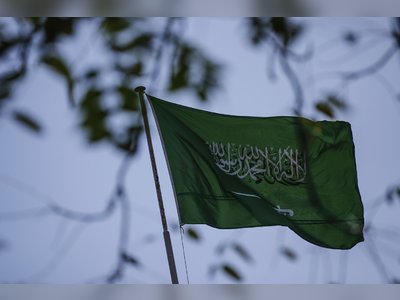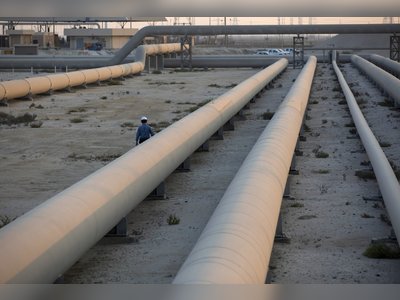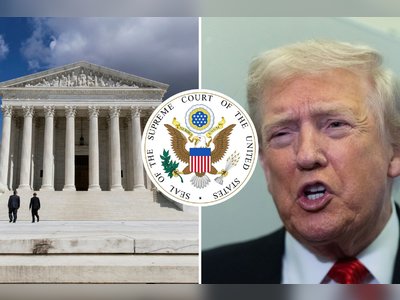Sources in Ramallah to "Asharq Al-Awsat": Significant Steps Required from All Parties After Resignation of Shtayyeh's Government
Palestinians Demand Washington Ensure Cessation of Gaza War and Israeli Withdrawal.
Following the announcement by Palestinian Prime Minister Dr. Mohammad Shtayyeh of his government’s resignation being at the disposal of President Mahmoud Abbas, political sources in Ramallah confirmed to “Asharq Al-Awsat” the need for significant steps from all factions in response. These sources also suggest that the American administration should pressure Israel to stop its warfare and provide guarantees for withdrawal from the Gaza Strip. The sources further noted that Hamas should facilitate the formation of a government of competence representing the unity of the Palestinian ranks.
A top official in the Fatah movement stated, “The resignation of Shtayyeh's government was not necessary; it was a good government led by a first-class economic figure. Despite Israel's economic war against it, the government withstood and achieved more than a few accomplishments.”
“Just two weeks ago, the government laid out a program for change, development, and reforms. However, it proceeded with the resignation in response to the international will to confirm the Palestine Liberation Organization's (PLO) sincerity in reforms, unifying the Palestinian ranks, and improving performance,” the official added, emphasizing, “At the top of our priorities is to stop the aggression on the Gaza Strip and the West Bank, and now it is time for others to act.”
Political sources in Tel Aviv had anticipated that this resignation would act as leverage to pressure the Israeli government, which had refused to let the Palestinian Authority assume management of Gaza "the day after" the end of the hostilities under various pretexts. The U.S. administration proposed a solution, supporting the PA's management of Gaza "after its renewal," which the PA complied with, and Shtayyeh's government presented a significant reform plan two weeks prior.
The U.S. Secretary of State, Antony Blinken, praised the plan, describing its reforms as "a good start," but Israel deemed them insufficient, calling for a Palestinian technocrat government focused exclusively on professional competencies.
Disagreement on Reference Framework
Hamas agreed to form a technocrat government but proposed another reference framework from different Palestinian factions, not from the PLO. The PA considered this approach "non-serious."
Palestinian efforts backed by Arab and international endeavors are underway to achieve domestic Palestinian understandings and avert a crisis, by emphasizing that Palestinian disagreements on this matter "serve Israeli Prime Minister Benjamin Netanyahu" and his right-wing extremist government, which seeks to evade stopping the war and reaching a prisoner swap deal. The Palestinian factions are set to meet in Moscow at the end of the week as part of an attempt to reach understandings.
The resignation of Shtayyeh's government came as part of attempts by the PLO and the Palestinian Authority to demonstrate a responsible stance towards the suffering of Palestinians in the Gaza Strip and the West Bank.
At the beginning of the weekly cabinet meeting on Monday, Shtayyeh said, “I placed the government’s resignation at the disposal of President Abbas last Tuesday, February 20, and today I submit it in writing." He affirmed that this decision is in light of the latest political, security, and economic developments related to the aggression against our people in Gaza and the unprecedented escalation in the West Bank and Jerusalem, facing our people, our Palestinian cause, our political system from an unprecedented and fierce onslaught, and from genocide and forced displacement attempts, and starvation in Gaza, and intensification of settlements, settler terrorism, and repeated invasions in Jerusalem, and the West Bank, to the camps, villages, and cities, and reoccupying them.”
Shtayyeh pointed out that his government "also faced an unprecedented financial squeeze," attempts to liquidate the UN Relief and Works Agency (UNRWA), disavow all signed agreements, gradually annex Palestinian territories, and attempt to reduce the Palestinian National Authority to an administrative security authority with no political content. It faced "severe battles," such as the "piracy of authority funds," referring to Israel's withholding of Palestinian tax revenues, then the Deal of the Century, then the Ukraine war, the battle of the COVID-19 pandemic, and currently the war on the Gaza Strip.
Shtayyeh concluded his resignation speech by stating that his government, which has been operating for 5 years, was a political and professional government including several political partners and independents, including 5 ministers from the Gaza Strip. However, the upcoming stage and its challenges necessitate new governmental and political arrangements. These must take into consideration the new reality in the Gaza Strip, national unity talks, and the urgent need for "Palestinian-Palestinian consensus" based on a national basis, broad participation, unity of ranks, and extending the authority over the entire land of Palestine.
Rejection of Netanyahu's Plan
For his part, the official spokesperson for the presidency, Nabil Abu Rudeineh, explained that the resignation of the government does not mean acceptance of Netanyahu's plan for the following day. This plan is rejected as its goal is to expand and perpetuate the occupation, evacuate civilians, and confirms to the whole world that it is committed to its aggression against the residents of the Gaza Strip, with its premeditated decision to invade the city of Rafah despite all international and global demands to stop this aggression and the crimes committed against our Palestinian people.
He added, “What is happening is a genocide against our people in the Gaza Strip. Everyone knows that the continuation of the barbaric aggression against our people and our holy sites, the condemned displacement attempts in the Gaza Strip and the West Bank, and the lack of a political horizon based on international legitimacy will destroy the entire region. The U.S. administration must act differently and seriously to stop this Israeli madness and take responsibility by committing the occupying state to stop this continuous aggression against our people and our land before it is too late. The ongoing U.S. support is what encourages the occupation authorities to escalate their aggression and crimes against our people.”
A top official in the Fatah movement stated, “The resignation of Shtayyeh's government was not necessary; it was a good government led by a first-class economic figure. Despite Israel's economic war against it, the government withstood and achieved more than a few accomplishments.”
“Just two weeks ago, the government laid out a program for change, development, and reforms. However, it proceeded with the resignation in response to the international will to confirm the Palestine Liberation Organization's (PLO) sincerity in reforms, unifying the Palestinian ranks, and improving performance,” the official added, emphasizing, “At the top of our priorities is to stop the aggression on the Gaza Strip and the West Bank, and now it is time for others to act.”
Political sources in Tel Aviv had anticipated that this resignation would act as leverage to pressure the Israeli government, which had refused to let the Palestinian Authority assume management of Gaza "the day after" the end of the hostilities under various pretexts. The U.S. administration proposed a solution, supporting the PA's management of Gaza "after its renewal," which the PA complied with, and Shtayyeh's government presented a significant reform plan two weeks prior.
The U.S. Secretary of State, Antony Blinken, praised the plan, describing its reforms as "a good start," but Israel deemed them insufficient, calling for a Palestinian technocrat government focused exclusively on professional competencies.
Disagreement on Reference Framework
Hamas agreed to form a technocrat government but proposed another reference framework from different Palestinian factions, not from the PLO. The PA considered this approach "non-serious."
Palestinian efforts backed by Arab and international endeavors are underway to achieve domestic Palestinian understandings and avert a crisis, by emphasizing that Palestinian disagreements on this matter "serve Israeli Prime Minister Benjamin Netanyahu" and his right-wing extremist government, which seeks to evade stopping the war and reaching a prisoner swap deal. The Palestinian factions are set to meet in Moscow at the end of the week as part of an attempt to reach understandings.
The resignation of Shtayyeh's government came as part of attempts by the PLO and the Palestinian Authority to demonstrate a responsible stance towards the suffering of Palestinians in the Gaza Strip and the West Bank.
At the beginning of the weekly cabinet meeting on Monday, Shtayyeh said, “I placed the government’s resignation at the disposal of President Abbas last Tuesday, February 20, and today I submit it in writing." He affirmed that this decision is in light of the latest political, security, and economic developments related to the aggression against our people in Gaza and the unprecedented escalation in the West Bank and Jerusalem, facing our people, our Palestinian cause, our political system from an unprecedented and fierce onslaught, and from genocide and forced displacement attempts, and starvation in Gaza, and intensification of settlements, settler terrorism, and repeated invasions in Jerusalem, and the West Bank, to the camps, villages, and cities, and reoccupying them.”
Shtayyeh pointed out that his government "also faced an unprecedented financial squeeze," attempts to liquidate the UN Relief and Works Agency (UNRWA), disavow all signed agreements, gradually annex Palestinian territories, and attempt to reduce the Palestinian National Authority to an administrative security authority with no political content. It faced "severe battles," such as the "piracy of authority funds," referring to Israel's withholding of Palestinian tax revenues, then the Deal of the Century, then the Ukraine war, the battle of the COVID-19 pandemic, and currently the war on the Gaza Strip.
Shtayyeh concluded his resignation speech by stating that his government, which has been operating for 5 years, was a political and professional government including several political partners and independents, including 5 ministers from the Gaza Strip. However, the upcoming stage and its challenges necessitate new governmental and political arrangements. These must take into consideration the new reality in the Gaza Strip, national unity talks, and the urgent need for "Palestinian-Palestinian consensus" based on a national basis, broad participation, unity of ranks, and extending the authority over the entire land of Palestine.
Rejection of Netanyahu's Plan
For his part, the official spokesperson for the presidency, Nabil Abu Rudeineh, explained that the resignation of the government does not mean acceptance of Netanyahu's plan for the following day. This plan is rejected as its goal is to expand and perpetuate the occupation, evacuate civilians, and confirms to the whole world that it is committed to its aggression against the residents of the Gaza Strip, with its premeditated decision to invade the city of Rafah despite all international and global demands to stop this aggression and the crimes committed against our Palestinian people.
He added, “What is happening is a genocide against our people in the Gaza Strip. Everyone knows that the continuation of the barbaric aggression against our people and our holy sites, the condemned displacement attempts in the Gaza Strip and the West Bank, and the lack of a political horizon based on international legitimacy will destroy the entire region. The U.S. administration must act differently and seriously to stop this Israeli madness and take responsibility by committing the occupying state to stop this continuous aggression against our people and our land before it is too late. The ongoing U.S. support is what encourages the occupation authorities to escalate their aggression and crimes against our people.”
















